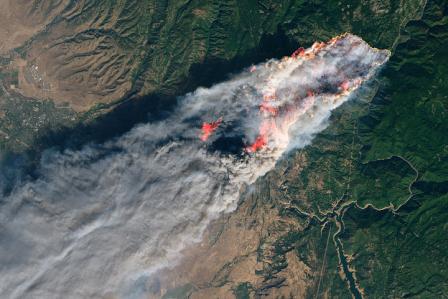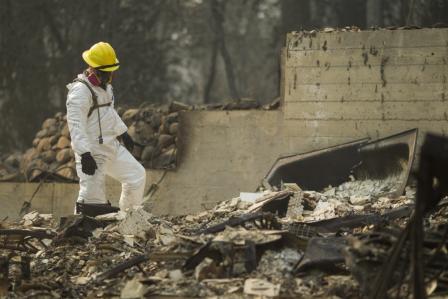Archived Content
This site contains information that has been considered archived and will no longer be updated.
"Completely Different" - EDA's Locally-Driven Approach To Development Supports Butte County, California's Recovery From Wildfire
California has experienced its share of disasters. Nearly a dozen major earthquakes have rocked the Golden State in the last decade, and fires, flooding, and adverse weather events are a fact of life on the Pacific coast. But nothing could completely prepare California for the destruction wrought by the Camp Fire. The 2018 wildfire — which devastated mountainous and semi-rural Butte County — has gone down as the most devastating in state history. Among its victims was the picturesque Town of Paradise, a community of 26,000 nearly erased from the map after 90 percent of its homes were destroyed.

Barely had the embers from the Camp Fire stopped smoldering than 3CORE— an Economic Development Administration (EDA) designated Economic Development District (EDD) serving Butte, Glenn, and Tehama counties in California’s Central Valley — got to work on plans to rebuild. 3CORE programs were among the first activated to reinforce the region’s crippled economy. Leveraging deep, community relationships forged over the organization’s 35 years of locally-based work, 3CORE immediately enlisted a private bank to establish an emergency microlending program that distributed funds to address the most urgent needs of small business.
But the scale of the devastation meant that more help was needed.
“Initially we thought recovery would take a couple years,” recalled Patty Hess, Executive-Director of 3CORE. “However, we soon realized that was unrealistic based on the magnitude of the disaster.”
Rebuilding from the Bottom Up
While more than 40 state and federal agencies descended on Butte County in the aftermath of the fire, EDA’s locally-driven, bottom-up approach to disaster recovery brought something unique to the table.

“Malinda Matson [EDA Economic Development Representative for Northern and Coastal California] came to us and asked, how can we support you?” said Chelsea Irvine, a former public information officer with the Small Business Administration who now works for 3CORE. “Sometimes federal agencies come in and know how to do everything and stomp their way around. This was completely different.”
One area of concern 3CORE highlighted to Matson was the stress on infrastructure in Chico, the county’s principal city. The added pressure on municipal resources was the result of a sudden population shift that occurred when residents of devastated areas migrated to surviving communities. Because Chico wasn’t in the fire’s footprint, it was ineligible for public assistance from some agencies. EDA, however, was able to provide a $13.3 million grant to the city to widen a critical two-mile stretch of Cohasset Road. This project, which will break ground in 2021, will not only improve access between three major job centers in north Chico but also increase capacity along a staging area used by first responders during natural disasters.
A Clear Canvas
In Paradise, the disaster’s epicenter, devastation was so complete that even survey monuments were destroyed. But out of tragedy came opportunity.
To maximize the efficacy of the recovery, 3CORE and EDA collaborated with other federal and state agencies to support different, but complementary, pieces of the town’s recovery. In late 2020, for instance, EDA and the Federal Highway Administration (FHA) each awarded grants to Paradise to rebuild its transportation infrastructure. While the FHA grant will support the construction of up to 100 miles of roadway to replace what was destroyed or damaged by the fire, EDA’s contribution is financing the development of a new transportation master plan that will allow the town to reimagine itself as it heads into a post-fire future.
Support for the Long Term
From capitalizing a Revolving Loan Fund that provides gap financing to local businesses, to funding the hiring of dedicated recovery planners by municipal governments, 3CORE and EDA continue to engage and support Butte County as it rebuilds.
“EDA actually did a ‘101’ seminar in Chico where we were able to invite our colleagues to learn more about the grants process,” Irvine explained. “To be there and to have a person answer those questions is completely mind blowing when it comes to disaster recovery. We had colleagues come from hours away to attend.”
In total, investments by EDA in Butte County since the Camp Fire are expected to create or retain nearly 1,000 jobs and generate more than $32 million in private investment.
“EDA has been a shining example of teamwork and collaboration,” said Hess. “It’s great to know we have such a partner.”
EDA has a long history of successfully supporting disaster recovery and resiliency efforts, including long-term community economic recovery planning and project implementation, redevelopment and resiliency. To learn more about EDA’s role in disaster recovery, please visit EDA's Disaster Recovery webpage.
